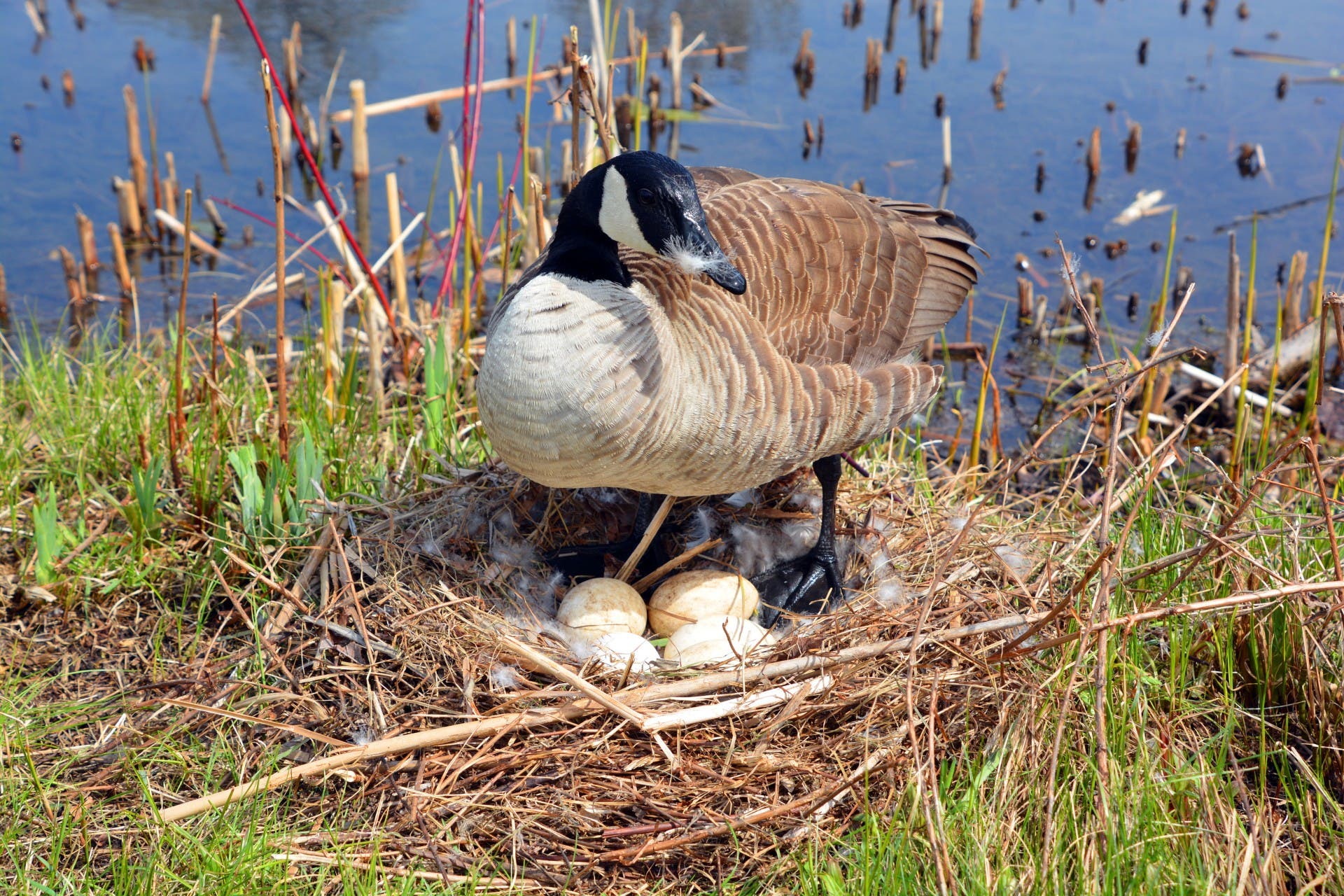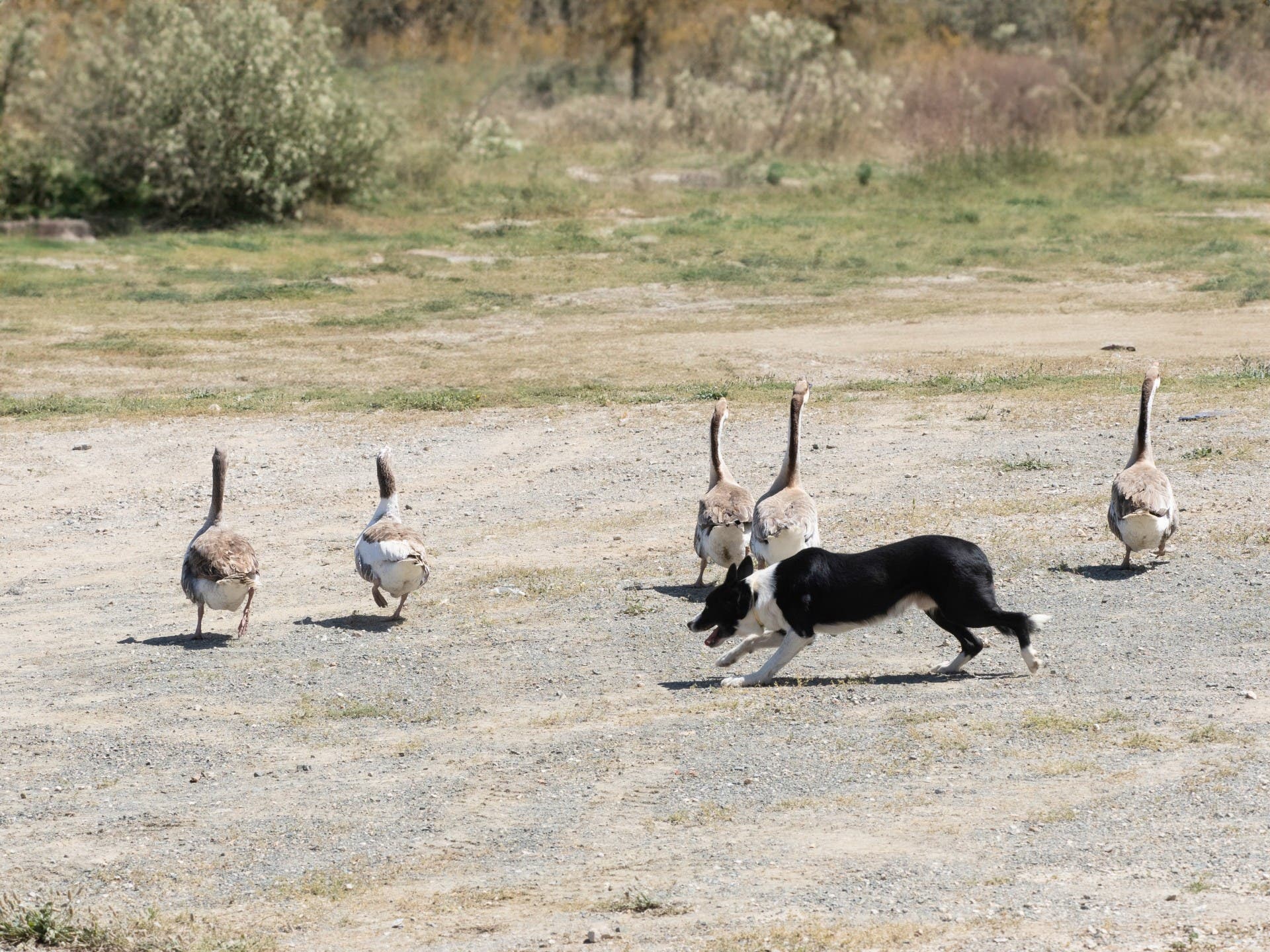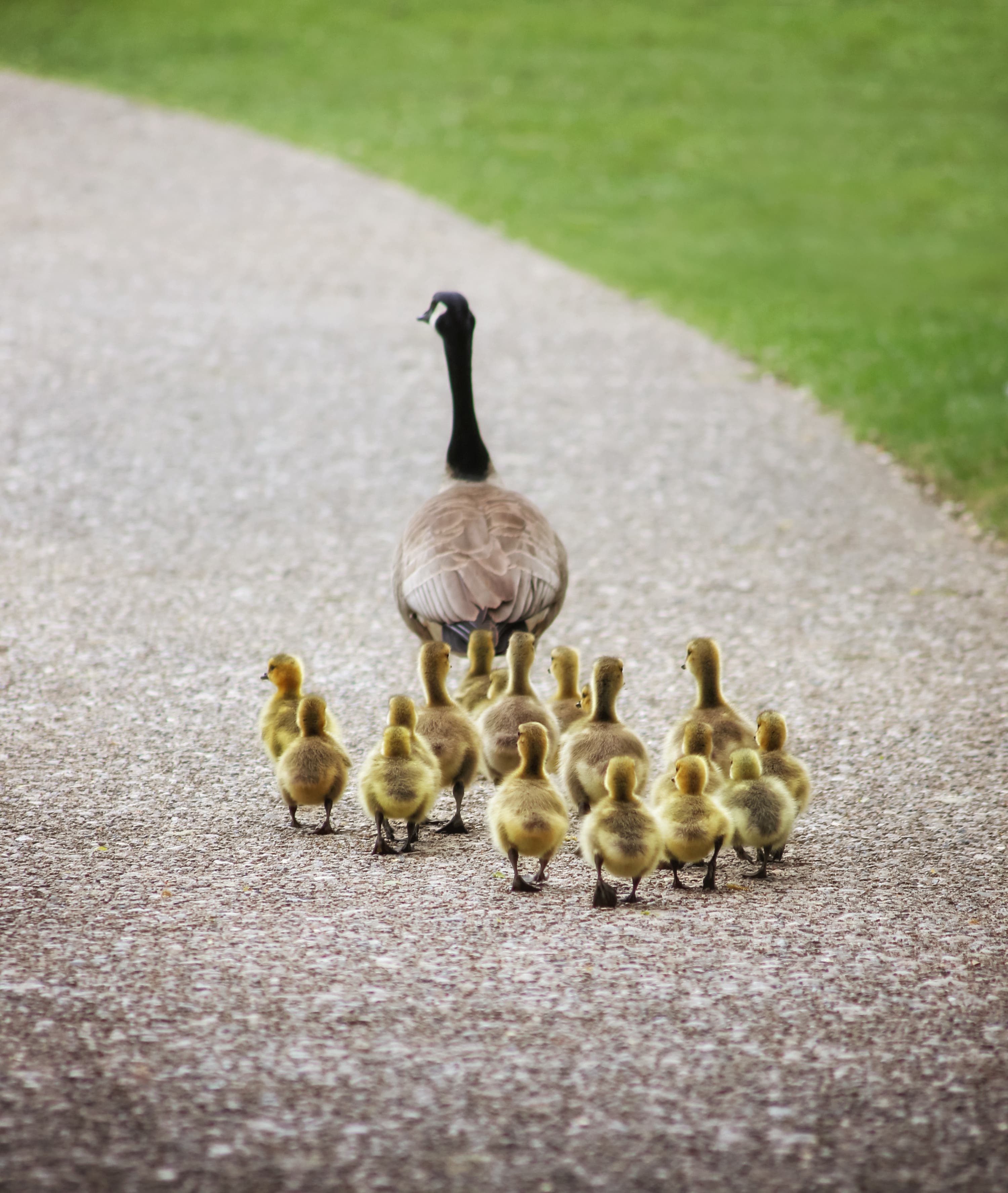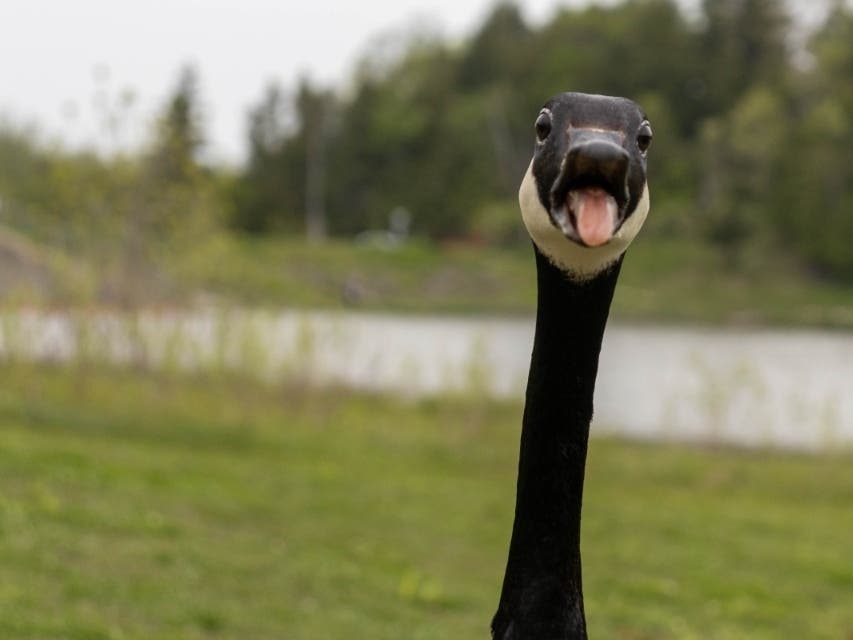Stop feeding the geese. Or put them on birth control. Or bring in some dogs to harass and chase them away. But do something.
“Anything,” Joe, a Milford (Connecticut) Patch reader said.
“Not a popular opinion, I’m sure, but I’d like to see them culled somewhat,” he said.
Find out what’s happening in Across Americafor free with the latest updates from Patch.
Joe was responding to our informal survey for Block Talk, Patch’s exclusive neighborhood etiquette column. We asked readers if geese are a problem where they live, and what, if anything, was being done about it.
The comeback of the Canada goose, once on the brink of extinction, is due to a variety of protective measures, as well as the expansion of suburbs with suitable habitats. They leave a big mess behind, fouling ponds and lakes and littering trails and walkways with their droppings. These big birds eat about 4 pounds of grass a day, and eliminate about half of what they eat at various times throughout the day.
Find out what’s happening in Across Americafor free with the latest updates from Patch.
Canada geese are still federally protected under the Migratory Bird Treaty Act of 1918. The U.S. Fish and Wildlife Service sets hunting seasons, but hunting is generally restricted to rural areas.
‘One Big Goose Latrine’
Joe wasn’t alone in thinking the goose population should be thinned and that special hunting allowances should be made.
“A few years ago, they tried cardboard cutout coyotes, but it seems like the geese made friends with them, so that never worked,” Joe said.
Joe’s opinion that numbers should be culled was more popular than he may have thought.
“Canada geese are a huge problem. They leave a terrible mess, and nothing is being done to cull their numbers in suburban areas — or at least in ours,” said Michigan Patch reader Marilyn, who lives in Oxford.
“Like many other wild animals, their numbers need to be managed,” Marilyn said. “My hope is that efforts to catch and euthanize them increase soon. There aren’t enough predators to keep their numbers under control, and they multiply something fierce!”
“Maybe they could be humanely culled and used to feed people,” said Ray, an Alameda (California) Patch reader. “When I was a teacher in Alameda, kids would slip on goose poop on the field and get covered in feces. It was disgusting.”
Geneva (Illinois) Patch reader KTBo feels that.
“Parts of the bike path along Route 25 in Geneva and St. Charles are absolutely disgusting,” KTBo said. “The area across from Langum Park is one big goose latrine. For crying out loud, can’t the city at least come clean it off?”
‘It’s A Conundrum’
The question is, what’s the best method of control?
“It’s a conundrum,” said Milwaukee Patch reader Ellie.
“We enjoy watching the vees of geese honking above. Our local ponds are home to their nests. When my husband jogged (not since his knee replacement), the adult geese would scare him off with their aggressive 6-foot wingspan and hissing. He learned to give them wide berth,” she said
“That some areas have problems relating to the birds is understood, especially in this age of bird illness. Our area is part of the birds’ migration path. Disrupting that means that they could not find their way in spring and fall.”
Whatever is done to manage populations, “Let’s refrain from going backwards by use of drastic measures, please,” Ellie said.
Nashua (New Hampshire) Patch reader Tb agrees.
“I think we need more education on how to solve this problem without causing harm,” Tb said.
‘The Pill’ For Geese?  (Shutterstock)
(Shutterstock)
“I see them hanging out closer and closer to where I live. I don’t like it,” said Mem, a Norwood (Massachusetts) Patch reader. “Put them on some type of birth control to ease the goose population.”
Mem wondered, “Is there something safe for humans that could be sprayed on grass and foliage which contains a contraceptive for geese?”
There is.
OvoControl, a bait the size and shape of a corn kernel that prevents eggs from hatching, can be broadcast in areas where geese feed, but it could have unintended consequences on other species and the environment in general, according to the Environmental Protection Agency.
Also, the pesticide can be used only by certified applicators or those under their direct supervision, and its use is restricted to urban areas, such as office parks, recreational parks, airports, golf courses, schools, hospitals, restaurants, and commercial and industrial sites.
Addle The Eggs
A better solution, said Vienna (Virginia) Patch reader JB, is allowing geese to lay eggs as normal, and then implementing control measures.
“Eggs in nests around nuisance areas should be addled (shaken or oiled) so they don’t develop,” JB said, adding that federal permits are available for such measures and volunteers can carry them out under supervision by appropriate authorities.
“This way, only the non-migrating (permanent) populations are affected,” JB said. “Adult birds are not harmed.”
“They used to put tar on the eggs and that helped. Something needs to be done,” said Northport (New York) Patch reader Angela. “I live in Crab Meadow in Northport. They appear in March or April. They poop all over our lawn and scare our children as they walk down the street, etc.”
Mount Pleasant-Sturtevant (Wisconsin) Patch reader Mike said his homeowners association obtained the required permit to treat the eggs of the five families of geese nesting in the area.
“We also harass them to make them find another home,” Mike said. “We have had issues with neighborhood pets ingesting their poo, and getting very sick, including one dog dying. It is now very hard to use your yard with their presence. And they no longer just remain near water but venture out far from it.”
New York City Patch reader Warren, who lives in Manhattan, suggested giving the geese a tummy ache.
“Find a way to dissuade the geese from making themselves a home — maybe some high-frequency sound that humans can’t hear, maybe feed that makes their digestion uncomfortable and makes them not want to be in the area,” Warren said. “I’m not a scientist, but I believe there are nonviolent ways to get rid of these obnoxious geese.”
‘Cook And Eat ’Em’
Several readers recommended controlled hunting events, similar to those some jurisdictions organize with state wildlife agencies to thin urban deer populations. Canada geese were taken off the endangered and threatened species list in 2001.
“Stop protecting the geese; they are no longer endangered,” said Patty, a Wisconsin Patch reader who lives in Lake Tomahawk. “But our children are playing in the yard or beach with goose poop every one to four inches — after intensive clean up the day before.”
“Let us hunt them to cut down the population, and offer money,” said Oswego (Illinois) Patch reader Brian, citing a $100 bounty on invasive black carp in his state. “Maybe $10 a goose?”
“Cook and eat ’em,” said Mission Viejo (California) Patch reader Jimbo.
“Round them up, kill them and give the meat to a food shelf,” said Grandma, an Oakdale (Minnesota) Patch reader.
“Fair game. They either should be shot lethally on sight, or people should carry golf clubs for driving practice on them,” said Bob, a Parisppany (New Jersey) Patch reader.
Humans Created The Problem
The challenge stems from human decisions and actions, Rye (New York) Patch reader Nature Kate said.
“People should stop feeding the geese directly and indirectly,” Nature Kate said. “Most municipalities and homeowners with geese alter the habitat, creating huge monoculture lawns usually fenced in with limited biodiversity and a lack of natural predators. This is inviting them to move in by offering an ideal habitat and an open buffet.”
“Stop building,” said Sarasota (Florida) Patch reader Ian. “Not one more nail used.”
Concord (New Hampshire) Patch reader Tess said fencing around has been installed round water in some places to discourage geese “from pooping on the pavement.”
“But they still do,” she said, advocating for “more fencing to prevent dogs and people from walking in the goose poop.”
“Stop mowing right next to the water,” said St. Charles (Illinois) Patch reader Roz. “Leave a three-foot-wide strip. Plant more vegetation. Geese prefer open spaces so they can look out for predators, so you can take that away by getting more plants and bushes.”
“Humans are the problem,” said Cumming (Georgia) Patch reader Kim. “Ban humans.”
Geese are a problem where Farmington-Farmington Hills (Michigan) Patch reader Frankie lives, but nothing is being done about it, the reader said.
“Some people are buying feed to keep them around. Make it illegal t feed them. Advertise ‘don’t feed them,’ ” Frankie said. “Relocate them. Kill them and feed them to animals at zoos or wherever.”
“Get people to stop feeding them,” Brick (New Jersey) Patch reader Pj said. “We’ve tried the dog
statues, ribbons in the wind, whirligigs. Nothing works.”
This Calls For A Border Collie  (Shutterstock)
(Shutterstock)
Try real dogs, Media (Pennsylvania) Patch reader said. “Allow dogs to exercise in open spaces.”
Joni, a Burke (Virginia) Patch reader, pointed out that some companies use highly trained border collies, which have natural herding instincts, to keep geese away.
“Our daughter went to Wheaton College in Massachusetts in the late 1990s. They had an awful problem with the geese. They finally got a border collie that moved them along every morning. In time, they quit returning,” said Lee, a Connecticut Patch reader.
“I believe you can rent one,” Lee said.
Some companies also use “predator drones” to harass geese and encourage them to relocate, Berwyn (Pennsylvania) Patch reader Carol said. Also, because they are no longer endangered, “allow hunting and egg rattling,” Carol said.
New Canaan (Connecticut) Patch reader Henrietta isn’t particular about the remedy. Geese are a “huge problem” in her town, Henrietta said. Her home, directly across a pond from a golf course, had become a sanctuary for the geese the club was actively trying to repel from their greens.
“They s- – t on everything and honk 24/7. We were unable to sleep for three solid months last year. It’s a disgrace,” Henrietta said.
“Removal, thinning, anything to protect the elderly and children who live here from avian flu, and the fumes and toxins that come from these massive birds who are not afraid of humans,” Henrietta said. “We’ve had 600 at a time on our property, and it’s horrendous!”
Live And Let (Geese) Live  (Shutterstock)
(Shutterstock)
Woodbury (Minnesota) Patch reader Junie is a live-and-let-geese-live kind of person.
“I grew up around a pretty healthy population of Canada geese. Let’s just say I grew up dodging goose poop on sidewalks and parking lots because I spent a lot of time near water. Yes, they snarl traffic (not a psychopath, I do stop). Yes, it’s annoying dodging goose poop on trails near water. I don’t see them as much of a problem because they have always been where I am,” she said.
“The fact of the matter is, WE are impacting their environment,” Junie continued. “They are crossing our busy roads in search of bodies of water because we keep building neighborhoods and roads. They were here before we had trails and sidewalks for them to poop on. Unless you’re willing to drain your neighborhood pond or lake, we are going to have to coexist.”
Junie wasn’t alone in expressing that sentiment.
“Leave them alone,” said Aqua, a Massachusetts Patch reader who lives on Cape Cod.
“They come into my yard with their goslings, and I enjoy their intelligence and how they care for their young. The father lets the mother and children eat first,” said Branford (Connecticut) Patch reader Mae. “Treat them with respect. Spray goose repellent if you don’t want them in your yard. We humans have over developed the shoreline, etc., so these animals have nowhere else to go.”
“Ask them to come to my house,” said Star, a Framingham (Massachusetts) Patch reader. “Geese, unfortunately, are not around my yard.
“I would love them,” she said.
About Block Talk
Block Talk is a regular Patch feature offering real-world advice from readers on how to resolve everyday neighborhood problems. If you have a neighborhood etiquette question or problem you’d like for us to consider, email beth.dalbey@patch.com, with Block Talk as the subject line.
Get more local news delivered straight to your inbox. Sign up for free Patch newsletters and alerts.
Posted Fri, Aug 8, 2025 at 2:34 pm ET

